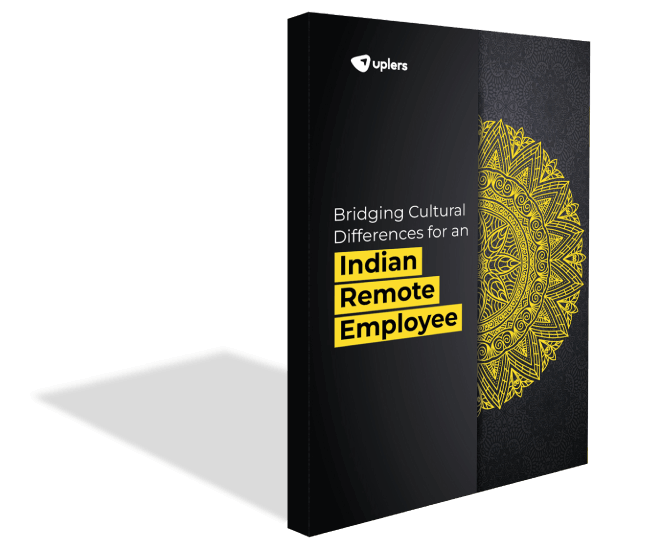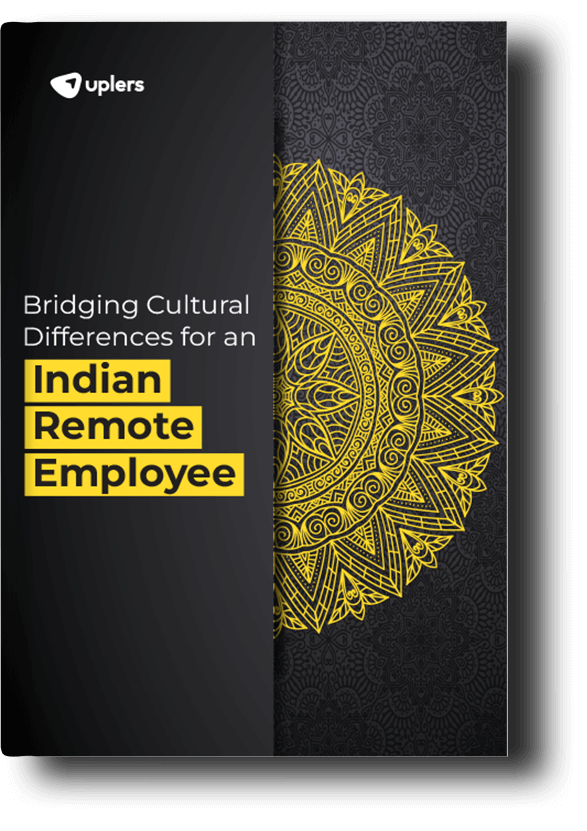Cultural Differences You Need to Know Before Hiring Talent in India
- Aabha Tiwari
- May 26, 2023
- 7 Minute Read

India boasts the third-largest workforce in Web 3.0, with an impressive number of six million software developers and 170,000 professionals specializing in AI, data analytics, robotics, and cyber security.
On the other hand, according to the U.S. Bureau of Labor Statistics report in 2022, the IT sector is expected to experience a 15% growth from 2021 to 2031, creating 682,800 new job opportunities. India’s abundance of skilled talent positions it well to meet the demand of the United States.
With this, tech hiring from India continues to grow in popularity as US-based companies are shifting to remote and distributed work. This approach offers flexibility in the hiring process and opens doors to tap into the vast potential of the world’s most intelligent untapped market.
According to 60% of recruiting managers surveyed, understanding Indian work culture and its disparities is the foremost hurdle when hiring tech talents from India. You can’t treat every talent in the same way. One should consider cultural background, geographical location, and recruitment expectations.
Understanding the customs and cultural differences of India w.r.t your company and how things are conducted in the country will help you to streamline your hiring process. When you know their cultural customs and put effort into understanding, engaging, and communicating with the top talent, hiring and retaining Indian tech developers makes working with people from India more manageable.
American Culture vs Indian Culture: Understanding Cultural Fit in Hiring
In a recent survey, 62 percent of participants identified a toxic culture as the primary cause for resigning from their jobs. Many professionals resort to “quiet quitting,” where they only perform the bare minimum required to retain their positions.
Consequently, workplace culture is rapidly becoming crucial for recruiters and HR managers to attract and retain high-quality talent. It is essential to recognize that this responsibility is flexible, as recruiters can actively contribute to developing and preserving a robust corporate culture through the concept of hiring for cultural fit.
The fundamental concept of cultural fit, from a scope of American culture vs. Indian culture, when hiring Indian remote developers is relatively simple: ‘Assessing how a talent’s presence will influence the company culture.’
Emphasis is placed on selecting the type of talent whose behaviors, values, and beliefs closely align with the established culture and norms of the organization.
How To Deal With Different Cultures In The Workplace: Hiring Indian Talents
Here are some essential insights into Indian working culture and cultural differences between India and USA, specifically for global companies.
These perceptions are derived from everyday experiences shared by decision-makers, recruiters, and managers of multinational companies, primarily from North America and Europe, during cultural awareness training.

Responding to Hierarchy
Most global companies, when working with Indians, have realized that these talents pay a deed to hierarchy. Hierarchy influences various aspects, including behavior and decision-making processes. These global tech companies must recognize how respect and deference are demonstrated towards superiors and their role in controlling the flow of information.
‘Yes’ Culture
Another driving factor is Indians often aim to please others in their communication style. Consequently, they tend to say what they believe will be pleasing, even if it contradicts the truth. Additionally, preserving one’s dignity is highly valued in Indian culture, leading individuals to say ‘yes’ to avoid losing face.
How Roles Are Dedicated
There is a misconception amongst recruiters that Indians are not proactive and tend to stick strictly to their assigned roles. However, this stereotype arises from a cross-cultural misunderstanding, making understanding Indian culture in the workplace more crucial.
You might be interested in reading: The Role of Employee Background Check While Hiring Indian Talents
Importance of Relationships
Indians quickly form close relationships with their colleagues. In India, it is customary to inquire about someone’s qualifications, salary, or family upon meeting them. This behavior should not be perceived as prying but rather as a genuine desire to establish trust and affinity with those they work with. Thus, investing time in building relationships is crucial.
Flexible Concept of Time
Indians do not adhere strictly to punctuality like some other cultures. However, this should not be misunderstood as tardiness or a lack of seriousness. It is essential to understand that, in the Indian context, time is perceived as a flexible concept. Events and activities are expected to occur when they naturally unfold.
Avoidance of Conflict
In Indian work culture and Indians, generally too, go to great lengths to evade conflict, even in private settings. Consequently, their communication style can be highly indirect, relying on the listener’s ability to read between the lines. Globally, this can be used to rely too heavily on literal statements and miss cues when Indians attempt to convey negative opinions or share sensitive information.
Conducting Business Meetings
When hiring developers from India, one must understand that in Indian culture, meetings are not platforms for open and candid discussions. Such openness can lead to conflict and result in loss of face. Meetings in India primarily focus on conveying information to subordinates or tactfully exploring ideas. To address challenging topics, companies should consider discussing them before or after the meeting, during breaks, or at a separate time to avoid cultural differences at work.
Cultural Difference In The Workplace: Tips On Implementing The Right Cultural Fit When Hiring: In 7 ‘Easy’ Steps

Know Your Organization’s Culture
Every organization naturally develops its internal culture, unintentionally or through deliberate efforts. In the business context, the latter approach is always preferable as it allows proactive measures to prevent the emergence of a toxic culture.
Organizational culture encompasses shared values, beliefs, a vision for the future, accepted behaviors, and preferred approaches to achieving goals. When you know and acknowledge your organization’s culture, this way, you understand the right fit for your company. Moreover, you yourself would be able to assess your company’s culture.
Tell Your Audience About Your Culture
When hiring, the audience primarily consists of talented job seekers. A recent study by Glassdoor revealed that 77% of these prospective talents consider an organization’s established culture and reputation before applying for a job.
Hence, from onboarding, during the job, retention, and when exit formalities are done, they should be done catering to the compliant culture for the employee. When you communicate your company’s culture effectively through multiple forums like the official website, social media accounts, recruitment brochures, and print media advertisements- especially considering cultural differences between India and USA, you communicate the idea of how your organization pays heed to the culture and bridging the gap between it.
Developing Trust
Regardless of the intricacies of the recruitment process, trust is irreplaceable, which is considered vital in the Indian work culture. It forms the basis for making well-informed and confident hiring decisions. To establish trust, consider the following steps:
- Maintain openness and honesty consistently.
- Fulfill promises and commitments as expected.
- Provide thorough and accurate answers to inquiries.
- Engage in dialogue to address any uncertainties.
- Maintain regular communication with candidates, utilizing their preferred method, throughout the recruitment process.
Building trust holds universal importance across cultures and remains a constant factor that should never be overlooked.
Understanding “Power Distance”
Power distance in a professional sphere refers to the interaction in terms of hierarchical differences, and it significantly impacts every aspect of the global recruitment process.
For instance, Indians tend to have a high power distance, meaning that employees prefer to be addressed using the appropriate job title and formally. On the employer side, US companies exhibit a lower power distance, fostering a more relaxed and informal atmosphere.
Understanding Cultural Ingrain Method When Hiring Indian Talents
By onboarding Indian talents with diverse backgrounds, skills, and personalities, you can enhance the overall diversity of your team. This strategy, known as hiring for “culture add,” offers a cultural advantage and provides access to a highly-skilled, experienced, and technically proficient talent pool.
When hiring and working with Indians, it is essential to avoid a one-size-fits-all approach. Instead, implement a well-defined process that evaluates their personality, skills, resume, and professional conduct. Assessing these aspects requires a deep understanding of the cultural dynamics involved in the hiring process.
Cultural knowledge should not be limited to mere company assets. It is essential to familiarize yourself with the talent’s background, knowledge, and the influences that shape their conduct. This comprehensive approach plays a significant role in understanding the talent profile. These measures enable you to assess candidates’ alignment with your organizational culture and their potential to bring unique perspectives to the team.
Have A Broader Understanding of Work Ethics And Culture
Develop a comprehensive understanding of work ethics across diverse cultures. In India, it is not uncommon for employees to spend long hours at work but take frequent breaks throughout the day. In France, the month of August is typically dedicated to vacations. In the United States, particularly among millennials, there is a growing emphasis on flexibility and the desire for more autonomy in choosing work hours and locations.
The variations in how individuals approach their workday across American culture vs Indian culture can be remarkably diverse. As a result, what constitutes a strong work ethic in one culture may differ significantly from another.
Familiarize Yourself With The Concept of “Cultural Sensitivity” And Its Significance
Certain companies may have a general Western or U.S.-based approach to the workplace culture, which can overshadow other cultural norms. Instead of imposing unfamiliar or uncomfortable cultural values on employees from different countries and expecting them to conform, it is important to actively seek ways to foster communication and understanding and manage cultural differences in the workplace effectively.
One practical approach is to engage team members in discussions about their preferred methods of approaching tasks or accomplishing goals based on their respective countries or cultures. This allows for a deeper understanding of diverse perspectives, facilitates problem-solving, and helps minimize cultural misunderstandings.
Emphasize The Team’s Shared Mission: With Indian Talent Hire To Your Global Company
Even as you work to manage an Indian talent to understand the diverse cultural elements of your employees, you may be pleasantly surprised to discover how much your global team members have in common. The more you can find ways to focus on common goals and values and the shared mission of your international team, the greater your chances for success in managing cultural differences in the workplace.



Thank you for submitting the details!
We will keep your information safe. Feel free to contact us with any questions at hello@uplers.com
Please check your email for next steps shared by Robert.





















